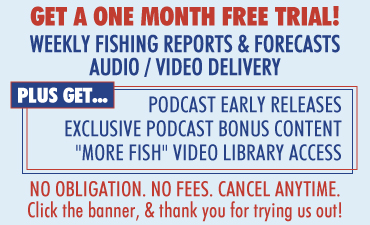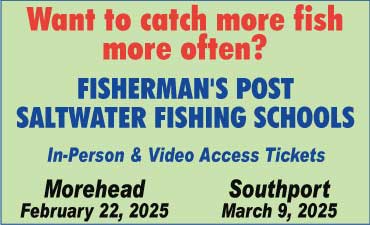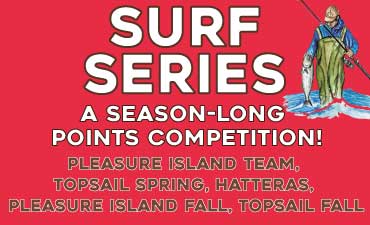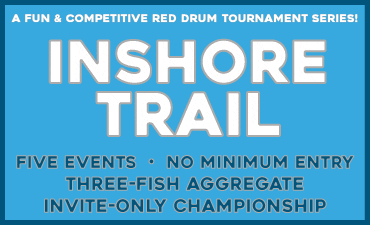Releases – July 2, 2015
To the delight of fishing fanatics across the country, The Crystal Coast has reeled in the world’s largest saltwater tournament trail–the Southern Kingfish Association. Avid anglers are invited to retreat to Morehead City, located within the Southern Outer Banks of North Carolina, for the 24th Annual Mercury Southern Kingfish Association National Championship, Oct. 22-24, 2015.
Whether it’s for a novice or seasonal “old salt,” each year the contest hooks thousands of anglers, providing a remarkable fishing experience and excellent pay out – recently more than $83,000 in cash and prizes for the Top 7 Mercury PRO teams, plus more than $270,000 in cash and prizes to the top placing National Champions.
Making its inaugural debut on the Morehead City waterfront, the destination is ideally situated along the Intracoastal Waterway, giving the frothy blue waters that caress its shores a crystalline quality often compared to the waters of the Caribbean.
“With the National Championship being our largest event of the year, we make a concerted effort to partner with dynamic fishing destinations that share our enthusiasm for the sport and put a fresh spin on the overall experience,” said Jim Butler, SKA Director. “There are plenty of fish in the sea, but we’re elated to have hooked a host destination as special as The Crystal Coast.”
“Our local community couldn’t be more excited to host this world-famous saltwater tournament,” says Carol Lohr, The Crystal Coast Tourism Authority executive director.
For more information on the Southern Kingfish Association, visit www.fishska.com or call (800) 852-6262.
July 4 is free fishing day in North Carolina. From 12:01 a.m. until 11:59 p.m., everyone in North Carolina can fish in any public body of water without purchasing a fishing license or additional trout fishing license.
Residents and non-residents can fish for free in public, inland waters, as well as coastal waters, although they will need to abide by all other fishing regulations, such as size and creel limits, as well as lure restrictions.
The N.C. Wildlife Resources Commission stocks a variety of fish in public, inland waters across the state throughout the year to give anglers a better chance of catching fish. Staff stocks cool mountain waters with brook, brown and rainbow trout, as well as walleye and muskellunge. In warm waters, staff stocks largemouth bass, American shad, striped bass, channel catfish, and sunfishes.
The agency also provides access to free fishing sites across the state, including public fishing areas and boating access areas. The interactive fishing and boating maps on the Commission’s website at www.ncwildlife.org list more than 500 fishing and boating areas, most of which are free, that are open to the public.
Authorized by the N.C. General Assembly and enacted in 1994, North Carolina’s annual free fishing day always falls on July 4. On all other days of the year, a fishing license is not required for anglers 15 years and younger, but anyone age 16 and older must have a fishing license to fish in any public water in North Carolina, including coastal waters.
To purchase a license: (1) Call the Commission at (888) 248-6834. Hours of operation are 8:00 a.m.-5:00 p.m., 7 days a week; (2) Go to www.ncwildlife.org using a computer or mobile device; (3) Visit a local Wildlife Service Agent.
The N.C. Wildlife Resources Commission will team with Mothers Against Drunk Driving, the State Highway Patrol, and other law enforcement agencies over the July 4 holiday weekend for the “On the Road, On the Water, Don’t Drink and Drive” safety campaign.
The annual multi-agency initiative works to ensure everyone can travel safely on the road and on the water during summer holidays. In North Carolina, a driver or boat operator with a blood-alcohol concentration that meets or exceeds .08 is subject to arrest.
“Operating a car or boat while impaired increases your chances of being involved and possibly injured in an accident,” said Lt. Sam Craft with the Wildlife Commission. “If alcohol is part of your holiday celebration, think before you drink. Have a designated driver. If you are charged with operating a boat while impaired, you will have to appear before a judge. Penalties include a maximum $1,000 fine and possible jail time.”
The “On the Road, On the Water, Don’t Drink and Drive” campaign is coordinated by the Wildlife Commission, State Highway Patrol, and Forensic Tests for Alcohol, and supported by the U.S. Army Corps of Engineers, Governor’s Highway Safety Program, U.S. Coast Guard, and local police and sheriff’s offices, along with participating non-governmental organizations, such as Mothers Against Drunk Driving.
Craft added that boating at night typically increases on July 4, which requires boaters to use caution and to be especially observant. Visibility is reduced and inland lighting rules are in effect. Water skiing is prohibited between one hour after sunset and one hour before sunrise. Personal watercraft are prohibited on state waters between sunset and sunrise.
Learn more about enjoying North Carolina’s waterways at www.ncwildlife.org/boating or call (919) 707-0031.
Recreational harvest of blueline tilefish in South Atlantic waters closed at 12:01 a.m. (local time) June 10, 2015. On March 30, 2015, NOAA Fisheries published a final rule which reduced the blueline tilefish annual catch limit from 111,893 pounds whole weight to 17,791 pounds whole weight. Landing reports indicate the revised annual catch limit has been exceeded.
On March 30, 2015, NOAA Fisheries also specified that the recreational season is from May through August each year unless closed through an in-season closure. Therefore, in 2016, the recreational sector for blueline tilefish is closed from January 1 through April 30 and September 1 through December 31. The recreational harvest will reopen at 12:01 a.m. (local time) on May 1, 2016.
During the closure: (1) The closure applies in both state and federal waters for a person onboard a vessel with a federal snapper-grouper permit; (2) The commercial sector for blueline tilefish closed to harvest on April 7, 2015; and (3) Sale and purchase of blueline tilefish in or from federal waters is prohibited.
This closure is necessary to protect the snapper-grouper resource.
Red snapper will remain closed in South Atlantic Federal waters in 2015. There will not be commercial or recreational seasons in 2015 because the total number of red snapper removed from the population in 2014 exceeded the allowable level.
The final rule for Amendment 29 to the Fishery Management Plan for the Snapper-Grouper Fishery of the South Atlantic Region published on June 1, 2015 (80 FR 30947). Regulations will be effective on July 1, 2015. The final rule for Amendment 29 will:
(1) Update the South Atlantic Fishery Management Council’s acceptable biological catch control rule to incorporate a new methodology for determining the acceptable biological catch of unassessed species.
(2) Adjust the acceptable biological catch value for 14 unassessed snapper-grouper species.
(3) Revise the annual catch limits for three species complexes and four snapper-grouper species.
(4) Establish a 12-inch fork length minimum size limit for gray triggerfish in federal waters off North Carolina, South Carolina, and Georgia for both the commercial and recreational sectors.
(5) Increase the commercial and recreational minimum size limit for gray triggerfish off the east coast of Florida from 12-inches to 14-inches fork length.
(6) Establish a commercial split season for gray triggerfish.
(7) Establish a 1,000 pound whole weight commercial trip limits for gray triggerfish.
Commercial harvest for gray triggerfish will open on July 1, 2015, and will close when the new quota is projected to be met.
Commercial harvest of gray triggerfish was closed on May 8, 2015, because it was determined that the previous annual catch limit of 272,880 pounds whole weight would be met by that date. Because this final rule is being implemented halfway through the 2015 fishing year and commercial landings of gray triggerfish have accumulated, the quota for the July 1 through December 31, 2015, fishing season will be the difference between the new total commercial annual catch limit of 312,324 pounds whole weight and the amount of commercial landings that have occurred by July 1, 2015.





